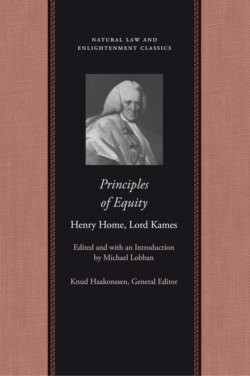Читать книгу Principles of Equity - Henry Home Lord Kames - Страница 15
На сайте Литреса книга снята с продажи.
Оглавление[print edition page 9]
CONTENTS
VOLUME I.
Introduction,
BOOK I.
Powers of a court of equity derived from the principle of justice,
PART I. Powers of a court of equity to remedy the imperfections of common law with respect to pecuniary interest, by supplying what is defective, and correcting what is wrong,
CHAP. I. Powers of a court of equity to remedy what is imperfect in common law, with respect to the protecting individuals from harm,
SECT. 1. Harm done by a man in exercising a right or privilege,
SECT. 2. Harm done by one who has it not in view to exercise any right or privilege,
SECT. 3. A man tempted or overawed by undue influence to act knowingly against his interest,
Art. 1. Where a man, yielding to a temptation, acts knowingly against his interest,
Art. 2. Where a man is overawed to act knowingly against his interest,
SECT. 4. A man moved to act unknowingly against his interest, by fraud, deceit, or other artificial means,
SECT. 5. What remedy is applied by a court of equity against the wrongs above stated,
[print edition page 10]
CHAP. II. Powers of a court of equity to remedy what is imperfect in common law, with respect to protecting the weak of mind from harming themselves by unequal bargains and irrational deeds,
CHAP. III. Powers of a court of equity to remedy what is imperfect in common law, with respect to the natural duty of benevolence,
SECT. 1. Connections that make benevolence a duty when not prejudicial to our interest,
SECT. 2. Connections that make benevolence a duty even against our interest,
Art. 1. Connections that entitle a man to have his loss made up out of my gain,
Art. 2. Connections that entitle a man who is not a loser to partake of my gain,
Art. 3. Connections that entitle one who is a loser to be indemnified by one who is not a gainer,
CHAP. IV. Powers of a court of equity to remedy what is imperfect in common law with respect to deeds and covenants,
SECT. 1. Where will is imperfectly expressed in the writing,
Art. 1. Where the words leave us uncertain about will,
Art. 2. Where the words are short of will,
Art. 3. Where the words go beyond will,
SECT. 2. Implied will,
SECT. 3. Whether an omission in a deed or covenant can be supplied,
SECT. 4. A deed or covenant that tends not to bring about the end for which it was made,
[print edition page 11]
SECT. 5. Equity with respect to a deed providing for an event that now can never happen,
SECT. 6. Errors in deeds and covenants,
SECT. 7. A deed or covenant being void at common law as ultra vires, can a court of equity afford any relief,
SECT. 8. Where there is a failure in performance,
SECT. 9. Indirect means employed to evade performance,
CHAP. V. Powers of a court of equity to remedy what is imperfect in common law with respect to statutes,
SECT. 1. Where the will of the legislature is not justly expressed in the statute,
Art. 1. Where the words are ambiguous,
Art. 2. Where the words fall short of will,
Art. 3. Where the words go beyond will,
SECT. 2. Where the means enacted fall short of the end purposed by the legislature,
SECT. 3. Where the means enacted reach unwarily beyond the end purposed by the legislature,
CHAP. VI. Powers of a court of equity to remedy what is imperfect in common law with respect to matters between debtor and creditor,
SECT. 1. Injustice of common law with respect to compensation,
SECT. 2. Injustice of common law with respect to indefinite payment,
SECT. 3. Injustice of common law with respect to rent levied indefinitely,
CHAP. VII. Powers of a court of equity to remedy what is defective in common law with respect to a process,
